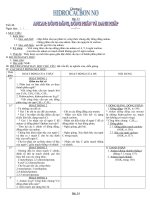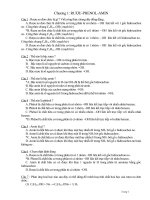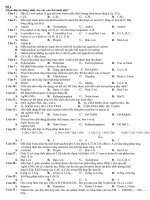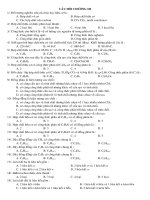hidrocacbon
Bạn đang xem bản rút gọn của tài liệu. Xem và tải ngay bản đầy đủ của tài liệu tại đây (32.78 KB, 1 trang )
<span class='text_page_counter'>(1)</span><div class='page_container' data-page=1>
1.Time clause!
<b>1.WHEN + S + V1, S + WILL +V2</b>
Ex:When I seeyou tomorrow,I will give it to you
Trong trường hợp này,cho ta thấy thêm một chú ý,mệnh đề "when" KHÔNG chia ở
future
<b>2.WHEN + S + V1, S + WILL BE + V-ING</b>
Ex:When you readthis letter,I will be visitingFrance.
<b>3.WHEN + S + V1, S + WILL + HAVE + P.P(past participle)</b>
Ex:When you readthis letter,i will have been in France for 5 year.
<b>4.WHEN + S + V2, S + was/were +V-ING</b>
Ex:When I came,they were sleeping.
<b>5.WHEN + S + V2,S + V2</b>
Ex:When I wound the alarm clock,it wentwrong.
<b>6.WHILE + S + WAS/WERE + V-ING,S + WAS/WERE + V-ING</b>
Ex:While I was reading books,my mother was cooking
Đây là trường hợp thì tiếp diễn được chia ở mệnh đề thời gian.
<b>7.BEFORE + S + V2, S + HAD + P.P</b>
Ex:Before I wentto the cinema.I had doneall my homework.
<b>8.AFTER + S + HAD + P.P, S + V2</b>
Ex:After I had donemy homework,I wentto the cinema.
<b>9.S + HAD + HARDLY/NO SOONER + P.P WHEN/THAN + S +V2</b>
Ex:She had hardly/no sooner gonehome when/than it rained
Chú ý:hardly...when ; no sooner....than
<b>10.S + HAVE + P.P + SINCE + S + V2</b>
Ex:Her knowledge has increasedsince she startedcollecting stamps.
<b>Embedded sentences</b>
Ex:I don't know where they are
2.Passive voice!(Thể bị động)
<b>Công thức chung:BE + P.P(past participle)</b>
<b>Dạng đơn giản:</b>
-Active:(chủ động)S + V + O
</div>
<!--links-->









